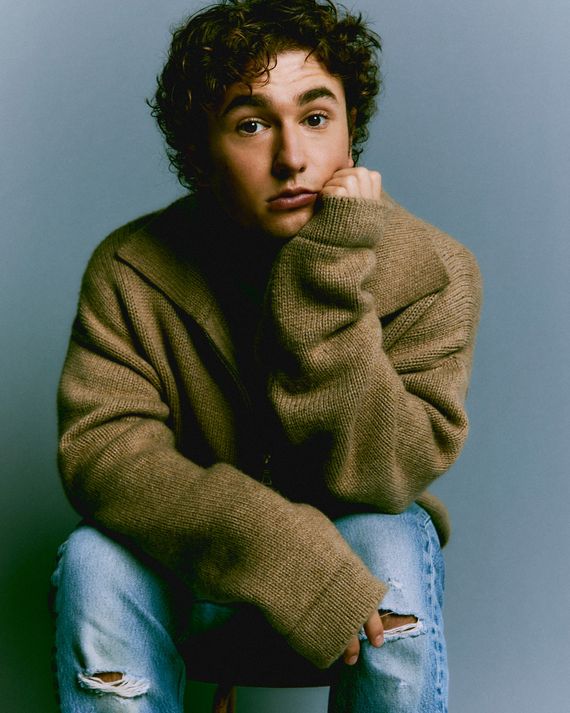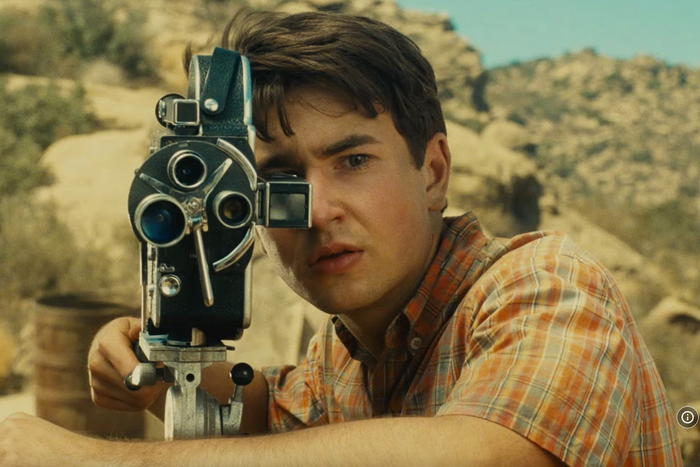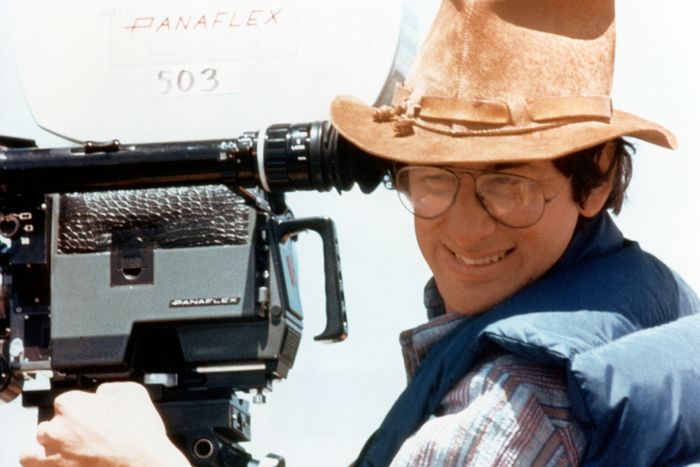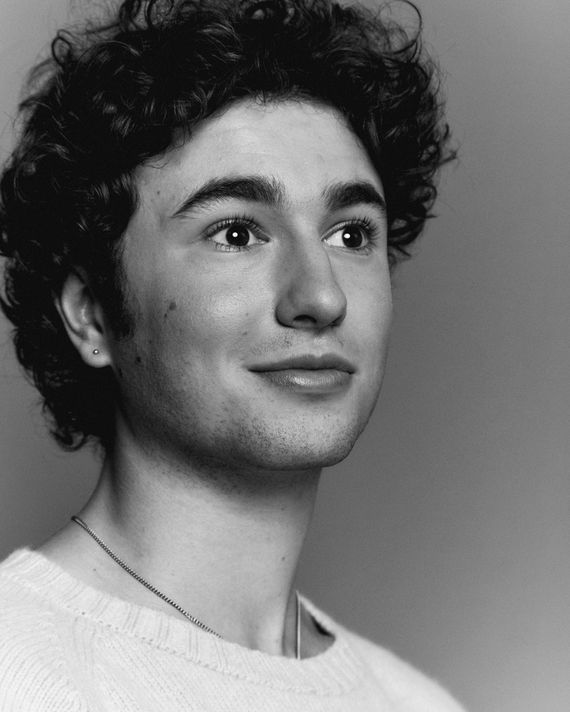
Gabriel LaBelle is not playing a young Steven Spielberg in The Fabelmans, but Sammy Fabelman is pretty close. He moves to Arizona with his family in the late 1950s, falls in love with making home videos, and observes the collapse of his parents’ marriage — all events that happened to Spielberg, who directed and co-wrote the film. But LaBelle’s performance isn’t an imitation, not exactly. He emulates Spielberg’s stiffened posture but doesn’t try to match the current depth of his voice or speak in run-on sentences, in part because the director told him not to. He wears green contact lenses but has a rounder face. He evokes some core of one of Hollywood’s most famous auteurs while also inventing a particular character meant to serve this film’s particular fiction. LaBelle draws a triangle with his hands as he explains it. There’s Spielberg, himself, and then Sammy somewhere in between.
The key to becoming sorta Spielberg, LaBelle tells me on the patio of a coffee shop in his neighborhood of West Hollywood, lies in his smile. He presses down the front of his lip and pulls up the sides of his cheeks to show me just how. “This muscle doesn’t go up,” he says, the top of his lip covering his teeth. It’s an enthusiastic, slightly dorky grin that you might not have clocked on the director’s face, but once you see it, things immediately align. “It helped me transform into this character,” he says. “It adds his essence.”
LaBelle, wearing a T-shirt depicting the band Queen, shorts, and the kind of slip-on slides you might have on around the house after the gym, reverts to his own smile: broader, dimplier, with teeth fully visible. Newly 20, he has a shock of Gen-Z curls — unlike Sammy Fabelman’s gelled mid-century coiffure — a bit of scruff, and studs in his ears. When I showed up to meet him, he had his head down and was writing in a journal. He’s deeply earnest about his love of acting, if a little daunted by finding himself in the eye of a movie certain to make landfall in the center of the fall awards race; The Fabelmans won the big People’s Choice Award at the Toronto International Film Festival in September. Concurrently, he stars as the younger version of Jon Bernthal’s character Julian Kaye in Showtime’s American Gigolo, providing a traumatic backstory for his life as a sex worker. “There’s so much coming up, but honestly I don’t think about it much,” he says. “I don’t know if I’m blocking it out of fear or I just choose not to.”
LaBelle got into acting when he started going to a local theater summer camp in Vancouver, where he grew up, at age 8. During several summers there, he appeared in a succession of plays and musicals, landing the plum roles of Lord Farquaad in Shrek, though he wanted to play Donkey, and Aladdin in Aladdin, though he wanted to play Genie. “Here I am, ten years later, just fuming,” he jokes. LaBelle began taking regular acting classes at 9, and by 11 he was auditioning for roles. His father, Rob LaBelle, is a consistently working character actor who has popped up in many of the American films and network-TV series that take advantage of British Columbia’s welcoming climate and tax incentives (including 2009’s Watchmen). Rob was also a producer on the Canadian detective procedural Motive, in which Gabe scored his first onscreen role as the son of a strangled mortgage broker. It landed him an agent, then a smattering of small parts throughout middle and high school, including as a member of a school basketball team on the CW’s iZombie and one of Jacob Tremblay’s bullies in The Predator. “I remember getting to watch them blow up a house,” he says. “I thought, This is a movie!”
By his senior year, in the spring of 2020, LaBelle had decided that he wanted to commit to acting as a career and applied to theater programs for college. He flew out to Montreal for auditions, then the province suddenly shut down due to COVID. He got into Concordia University’s drama program, but attending through his computer didn’t seem appealing. He’d built up visions of doing ragtag college productions of plays and then couch-surfing into New York’s theater scene, inspired by his dad’s stories of going to grad school at NYU, and now his plans were all put on hold. His friends went off to school, but for a year he stayed home with his family.
In March 2021, in came an offer to self-tape for an untitled film from Amblin, Spielberg’s production company. LaBelle didn’t know, initially, that Spielberg would be directing it, nor how large of a part this would be. The character was described as “Teenage Sammy,” so he guessed he might be replaced by an older actor later in the film. (LaBelle actually plays the role for the second two-thirds with Mateo Zoryon Francis-DeFord playing “Younger Sammy.”) After he sent in the tape, he learned from his manager that Spielberg was in fact directing this movie and that it was based on Spielberg’s own life. He saw news about Michelle Williams, Seth Rogen, and Paul Dano joining the cast and then heard … nothing.
It wasn’t until May that he got a text about a callback. Two days later, he set up his phone on a tripod, did some breathing exercises, shooed his parents out of the house, then came face-to-face with Spielberg over Zoom. “It was a really intimate experience,” LaBelle says. “There were 40 people on the call with their cameras off, but it was just him and I talking. I felt in my bones it was the best performance I’d done in my life.” It’s a dynamic he would later replicate in the film, which dramatizes Spielberg’s encounter with the legendary director John Ford (played by David Lynch with dialogue that, according to LaBelle, is word for word from Spielberg’s memory). The next day, he was told he got the part.


According to Cindy Tolan, The Fabelmans’s casting director, LaBelle was one of about 2,000 people who submitted tapes to play teenage Sammy Fabelman, a process that stretched back to November 2020. They knew it would be a particularly hard role to fill. How do you show a director a younger version of himself? She needed an actor who looked (passively) like Spielberg and also looked (actively) like a moviemaker. So much of the film depends on watching Sammy watch everyone around him, seeing his gaze reveal the world. Tolan says, “With Gabe, there was a poignancy. He could convey the pathos that was needed and also the humor.” When she brought LaBelle to the director, his mind was made up quickly. “I wasn’t looking for what I see in the mirror,” Spielberg says. “I was looking for a young actor who could carry a lot of story by being curious and honest and engaging and unpredictable.”
Prior to shooting, LaBelle read and reread the script. He rewatched Spielberg’s movies — Empire of the Sun, with a young Christian Bale, is his personal favorite — and kept talking with the director. He’d go scene by scene, asking what in Sammy’s life really happened to Spielberg and how he felt at the time. “Sometimes he’d tell me and open up, and other times he wanted me to figure it out on my own,” LaBelle recalls. In the latter parts of The Fabelmans, Sammy gets physically and verbally attacked for being Jewish; LaBelle and Spielberg connected over the experience of growing up as the lone Jewish kid at school, wondering whether certain classmates “were being hateful or trying to be funny and didn’t have that empathy.”
Once he got to set, LaBelle was surrounded by the heaping handful of Oscar winners and nominees with whom Spielberg regularly collaborates, like cinematographer Janusz Kamiński. The process of trying to live up to their caliber of work was both invigorating and exhausting. LaBelle drank so much coffee and Diet Coke on set that Julia Butters, who plays one of his younger sisters, would make fun of him for it. He speaks with great admiration for Michelle Williams, “the kind of actor I want to be,” who stars as Sammy’s mother — a shimmering, contradictory figure, a former pianist who, like Spielberg’s own mother, falls for her husband’s best friend. The Fabelmans has a fairy-tale quality, though it’s not sentimental; it’s about wishes that turn against you. In learning to create motion pictures, Sammy also learns to see his parents for what they really are and recoils from the discovery. Williams and LaBelle’s scenes together are the emotional high points, fights that cut deep and true.
At the end of filming one of them, LaBelle remembers himself and Williams both on their knees, holding each other in a corner of a soundstage. Then they heard the door open, and Spielberg walked in. “He has his sunglasses on, but you can see he’s totally welled up,” LaBelle says. “And he goes, ‘Okay, that’s enough of that.’ And we all hug each other.” What a strange bonding experience, LaBelle later muses, to be in a cast of actors all united in making Steven Spielberg cry.






